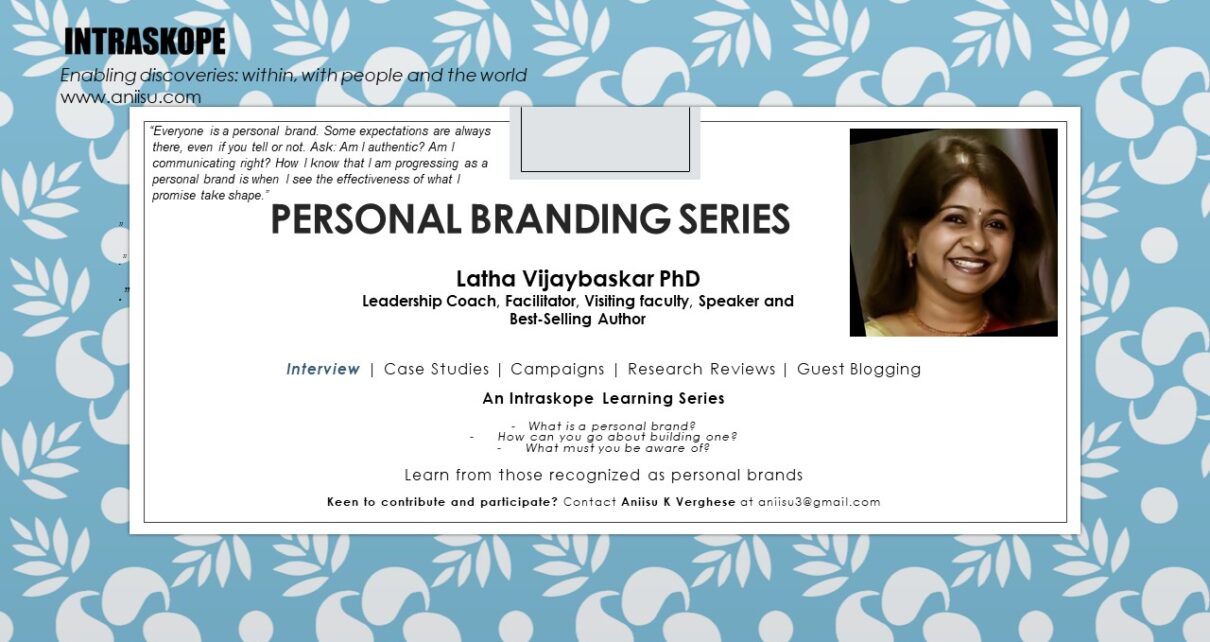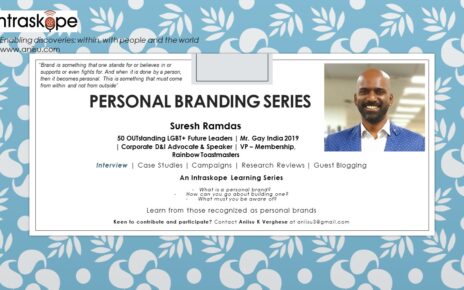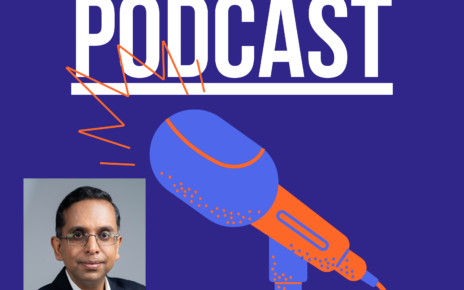Dr. Latha Vijaybaskar calls herself a “retired teenager who is optimistic and audacious enough to believe deep conversations and engaging collaboration will inspire action with remarkable celerity”. What strikes me about that statement is her candor, commitment and sense of humor. A holder of a PhD, three masters degrees, one in Psychology, one in management and an M.Phil, Dr. Latha has a lot to share and learn from when it comes to personal leadership and branding. What’s more compelling about her story is to prioritize her family while she went about her career and now entrepreneurial sojourn. Her story is an inspiration for many and she is currently focusing on the millennials, a generation with great potential; although they can do with a bit of direction and support.
Watch the YouTube video interview and read the complete interview below. Look up more such stories on my YouTube channel and on LinkedIn.
Interview
- What according to you is personal branding?
Personal branding is a promise. It is about what you stand for – your values and your strengths.
You are the living validation of your brand. What you talk and how you act.
2. Do you consider yourself a personal brand? How do you know it?
Everyone is a personal brand. Some expectations are always there, even if you tell or not. You need to ask some fundamental questions:
Am I authentic? Am I communicating right?
How do I know that I am progressing as a personal brand is, when I see the effectiveness of what I promise take shape. Also, what others perceive you as, gives you an indication. The lesser the gap between what you promise and what you do, is ideal. The gap is the space between my mind and others. My grand plan is to know that I am aligned with what is promised and how I am perceived.
Do you believe in the promise you make? Are you an advocate of it? Do you practice and preach it? Are you living your promise? That is where authenticity comes in. You need to stand for something. Ask yourself: Are you taking steps where your audience can see the process and result? Am I walking the talk? Am I the solution? If not, you are part of the problem as well.
4. What does one do to go about building a personal brand?
There are three steps.
- Ask the questions: looking inwards and deciding what your promise should be. Do you want to be an authentic personal brand? Remember, audiences are discerning and can figure out where the act starts and where authenticity ends.
- Know your goals: create a clear promise and it is better to have a sense of self awareness. Self-leadership is everything. Conversations can solve conflicts
- Live your promise: There is no point not believing in what you set out to achieve. If you have made a promise that you make, the audience must see it happen.
5. What are the attributes of a personal brand? And what do people associate your brand with?
According to me, it is alignment between promise and perception. People think of my strengths as relationships, coaching and conflict resolution. The promise is to bring out the leader in everyone. Through my books, coaching and conversations I can surface these attributes. People approach me for the promise I am making – mentoring, coaching and leading. My work speaks for itself. They know they can reach out for help. I know I am living and walking the talk.
6. Based on your observations and learning who according to you is a personal brand? What characteristics do you admire about them?
Peter Reding, a transformational coach is one such person. We met once and for an hour. However, that one meeting transformed how I see myself. I considered coaching after this interaction. He lives and breathes what he preaches and the results are stunning. Hope to emulate him and also that people whom I touch should feel inspired.
8. What steps did you take to build your brand? How do you know it is working?
The promise I made, the fact, you can lead yourself, it is a beautiful journey.
Every time I have to face a time of crisis, I ask what it can teach me. The roadblocks, the obstacles are time wasters. I have two grown-up kids and while I am going about my work, it is hard to concentrate. The biggest distraction has been the smiles on my children’s faces and nothing else matters most. In my career I have been a HR professional and also an academician. I have worked on my strengths and priorities. I need to know my constants and variables. I know I have an ability to connect with people. My key constant is that I am a hands-on mom. All the others are variables that I work around. My 2nd strength is academics. I am known as a boring person due to my interest in academics. I have always scored well in my exams. When I grew up, they continued to be my strength. I was doing a PhD while I had a small baby to look after. My son was born in 2007, and it was during the financial crisis. I felt it was a brilliant decision to take a break and go back to work after a two-year break. In 2008-9 I invested in myself and signed up for my PhD and had a degree in hand and then went back to work. My resume was good and transition was natural. I believe in delegating my weaknesses and I don’t worry too much about it.
9. What challenges did you face while building a personal brand? What techniques did you use?
I will refer to the 3 questions I mentioned earlier and the last question is a work in progress for me. Am I being able to put in the promise in the minds of my audience?
My knowledge in technology is a handicap for me to be in the digital world.
Staying on track is crucial. For example, the thrill of shifting of roles is a distraction. When I say I am a leadership coach and wrote 3 books, I get requests to speak to speak on how to write a book. Is that what I do? Probably not – I just do them myself but do I know how to help others. Telling no is another challenge. If you take on more areas and wear a few more hats, you dilute your brand.
10. What did you gain in the process? What did you lose?
I gained self-leadership, confidence and comfort in my own self. I got satisfied clients. Trust in the minds of people who know what you stand for. For example, someone whom I coached told me that you taught me self-leadership but I am now a better husband. I was in the shadow for so long and I am not a follower but a leader. I lost lots of years in preparing for where I wanted to be. Spent too much time in research and didn’t come out of my cocoon for a long time. The thrill to say something and the impulsiveness also cost me. If I look back, I have trained myself to think on my feet.
11. How can someone starting from scratch build a personal brand? What is the first step he or she must take?
Look deep inside that well that is you – what is your personal ambition? Draw out a very detailed plan to get. Don’t deviate. Distractions are more than the roadblocks, for example, every now and then stopping to take a selfie on the journey to sucess can be a challenge!
12. If you had the opportunity to change something about the way you built your personal brand, what would that be?
I would change my ability to shout out more about self although I believe my work speaks for itself.
13. What is your recipe for personal branding success?
Walk your talk. People are watching. You will lose trust if you don’t do this.
14. With COVID19 and other crises what steps can personal brands take?
The personal brand is what we are shouting out to others. It is something we live by. If there is a crisis or not, it is the best time to show people what your brand stands for. Times like these is where you have an opportunity to show your true self. We have faced many crises – in 2007, the financial trouble, in 2001 we had 9/11 and in 1992, globalization took off. Every 5-6 years we face something significant. You need to ask: how do I show self-leadership during this crisis? Your boss can’t see what you re doing in remote working. During a crisis – for every organization and every human, it is about the brand we live. Also, how our actions are sustained and stand the test of time.
15. What’s your advice for youngsters (Gen Z and others) who want to consider their personal brands?
For the emerging generation, there was a time when degrees were the most important thing. Today your passion is your most important thing. Be it in theatre, design, AI, gaming etc. whatever it is, two points must be considered. Life is not lived from the couch. It is not a spectator sport like watching movies and being a spectator. Whatever, you want to do, ensure you put in long hours – 10k hours as Malcolm Gladwell puts it. If you love swimming, get into the water. It is not a passion if you are just talking of it. We live in a selfie world. Look inside yourself and stay and work on it.
Liked this interview? Please do share your feedback and comments.
Keen to get ahead with your personal brand? Here are some resources:
- Take a FREE assessment on personal branding.
- Refer to the 3C model on Personal Branding
- Sign up for a 60-minute personalized chat on personal branding
- Personal branding for corporate communicators
Missed the earlier episodes? Read the interviews with Muqbil Ahmar, Tinu Cherian Abraham, Joseph Fernandez, Christina Daniels,Karthik Srinivasan,Gautam Ghosh, Alexander Michael Gittens, Mubeen Azeez, Itzik Amiel, Mangal D Karnad, Abhijit Bhaduri, Sandeep K Krishnan PhD, Scott Shirai and Sunil Robert online and share your thoughts.
Keen to join this Series and share your thoughts on Personal Branding? Write to me at [email protected]
Please subscribe to my YouTube Channel and follow me on Medium.



